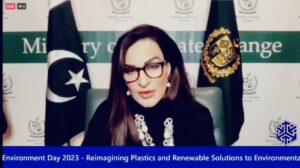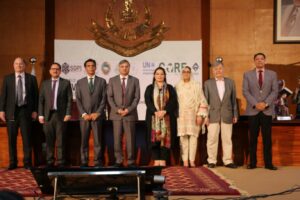Nation needs to act now to minimize use of plastics in daily life: Sherry Rehman
The Sustainable Development Policy Institute organized the conference
Report Islamabad (Imrana Komal)
Federal Minister for Climate Change and Environmental Coordination, Senator Sherry Rehman, Tuesday urges the nation to action now to collect, recycle, and re-use to minimize use of plastics in daily life. She said that Pakistan already lags behind the world’s 9% plastic recycling with only 3 to 4% recycling of its 400 million tons of plastic from its informal sector.

In her key note address at a conference on “Reimagining plastics and renewable solutions to Environmental degradation” on the eve of the World Environment Day, the Minister called for cost effective solution to promote recycling and reuse of plastic. Nation needs to act now to minimize use of plastics in daily life: Sherry Rehman
in collaboration with Allama Iqbal Open University (AIOU), National Disaster Risk Management Fund (NDRMF), Transforming Urban Development to Reduce the Impact of Natural Disasters (TRANSCEND)- University of Salford UK, Parliamentary Taskforce on SDGs, Action for Climate Change, CoRe Alliance, UNEP, and the Ministry of Climate Change at the AIOU Auditorium.
Senator Sherry urged the private sector to proactively reduce plastic consumption despite its noticeable cost. She said that Hazardous Waste Management Policy with strict recycling or reusing waste controls has been implemented. Research is important for hotspots of plastic pollution; we need to do research on implications of plastic, it should be comprehensive and there should be evidence-based researches and policy recommendations, she added.

The federal minister said circular economy model is not possible without recycling and reuse. And that could only be possible if we adopt whole of society approach and change our behaviors towards use of plastics with a view to reduce it slowly and methodically. Academia, civil society, and policy makers must work together to achieve a healthier circular economy. The private sector must be pressed to diversify and limit use of plastic and increase reuse and recycling processes. Shampoo sachet (aluminum inside) is extremely hard to biodegrade or reuse and must be done away with as a starting point. There is a need for research around startups on how new and cost low alternatives to single use plastics can be developed. The privileged must make a behavioral change before we ask our lower income citizens to make transitions, Senator Sherry added.
Special Assistant to Prime Minister, Romina Khurshid Alam remarked that while we clean our homes, but we weaken the roots of ‘Mother Earth’ with plastic pollution. She stressed on effective and strict implementation of environmental policies. She urged that everyone must act in their own capacity and stressed on strengthening environmental awareness since very young age. She said that climate change is impacting us and plastic pollution is the worst kind of hazard to our ecosystem. We have to give priority to reduce our plastics and promotion of its reuse and recycling to protect our moth earth.
Dr Nasir Mahmood, Vice Chancellor, AIOU called for climate action at individual and societal levels as these are the answers to our current environmental worries. He said that plastic pollution is a big crisis which we need to address by our actions. Quoting from the plastic free practices of the University, he said AIOU avoids plastic currier bags while sending bulk of published material to their hundreds of thousands of students. He said that the University plans to work towards achieving the goal of making its campuses plastic free gradually. He said the University is moving towards solarization of all campuses by next year and small water ponds are being constructed and plantation is being carried out for nature-based solutions to environmental problems.
Ambassador Shafqat Kakakhel, Chairperson, SDPI BOG, in his introductory remarks said that plastics have infiltrated our lives intricately that they are difficult to replace. He said that
“solutions to plastic pollution” rest with the idea of accepting the reality that we have to live with no or minimum plastic in our lives. Quoting from the global actions and plans being undertaken in this regard, he suggested that Pakistan speed up its ongoing efforts to promote the plastic resistant behaviors. He urged national institutions to proactively address these issues through institutional mechanisms and set example among the international community.
Dr Abid highlighting the multi-sectionality of plastic pollution urged for smart solutions and said that SDPI is trying to promote reduce, refuse, and recycle in practice. He said that today’s event is plastic free ranging from the banner to glass bottles in use. He said that the environment is choking on microplastics, water, and food and is aggravating global warming. He said that at SDPI, we are trying to phase out single-use plastics. He said that we need to bring about changes in our daily lives through changing our consumption behaviors. He said though this transition is expensive, but it is critical in the context of climate change and environmental degradation.
Farzana Altaf Shah, DG EPA, stressed that alternatives to plastic are available but without behavioral change, legislations alone cannot curb plastic pollution. She stressed that plastics are causing cancer and stressed that we need to come together to spread awareness and take responsibility at individual level.
Bilal Anwar, CEO, NDRMF that plastic has diverse utility and through proper waste management it can be transformed from being the problem to be part of the solutions. The situation of Pakistan is really alarming, we should work for the betterment of it. We as consumers are not really demanding for our rights; we should be aware of the facts that plastics are badly affecting our lives and environment. We should take care of the plastic usage in day-to-day life to avoid climatic hazards caused by plastic which does not decompose even in 100s years.
Dr Iqrar Ahmed, VC University of Agriculture, Faisalabad, highlighted that farmers must be educated regarding the toxic compounds in fertilizer bags which reduces their recycling potential.
Charles Schneider, Program Manager, IFC said private sector creates jobs and revenue and also produces bulk of plastic and hence it has the ability to help reduce the plastic. Private sector cooperation is important in achieving the goal of reducing plastics. There is a need to reimagine as how can we make plastics more valuable after use or post consumption for reuse or recycling. We need to promote it as a business.
Mr. Shah Jahan Mirza, Managing Director, Private Power & Infrastructure Board (PPIB), said that air pollution in the country is continuously rising and endangering health. To limit and eventually reduce air pollution, renewable energy is the best and cheapest alternative. The PPIB and the government envision that by 2031, around 61 percent of energy needs will be met through use of renewable energy (wind, hydro, solar and other technologies). If we can reach this milestone, economic benefits and energy security will be achieved. For such a transition, there is a need of $65-70 billion. We are hopeful that most of this funding can be provided by the private sector. In addition, automation and upgrading of the national grid dispatch system is essential for this transition.
Mr. Mustafa Hyder Syed, Executive Director, Pakistan-China Institute, said that when we talk about emissions, transport sector is the major contributor. Most of the middle- and upper-class people prefer use of multiple personal cars for transportation. This mindset also needs to be changed. The mindset and perceptions of the people can only be changed through
education. Yasir Darya, CEO Darya Labs, Dr Sonia Khalid AIOU Dean, Engineer Omar Hayat from the United States and Dr Sofia Khalid also spoke on the occasion.

